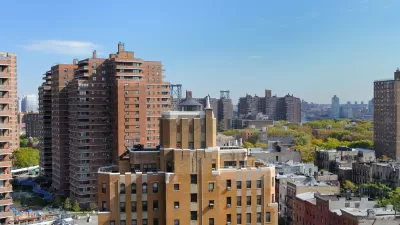Mayor Adams says the new plan will cut building processes by 50 percent to accelerate badly needed housing construction, but parts of the proposal still face hurdles to get approved.

A new strategy titled “Get Stuff Built,” announced by New York City Mayor Eric Adams on December 8, takes aim at the city’s housing affordability crisis and pledges to streamline the building process to accelerate housing construction. Maria Torres-Springer, the deputy mayor for economic and work force development, says that enacting all 111 proposed reforms could pave the way for 50,000 new homes in the next ten years.
According to a press release from the city, the plan includes 111 “concrete actions” for increasing the housing supply in three areas: City Environmental Quality Review (CEQR), land use approvals, and building permitting. “These actions will increase the speed and lower the cost of development by accelerating project timelines by 50 percent, ensure environmental protection and meaningful public participation, and stimulate the creation of affordable housing across New York City.”
A New York Times article by Sarah Garland and Dean Chang points out that the plan “faces significant political obstacles,” with some parts of the proposal requiring approval from the City Council or state legislature. Meanwhile, housing advocates say the administration should do more to help tenants stay in their homes, and preservationists worry that accelerating construction could ignore the environmental impacts of new projects and displace current residents.

Alabama: Trump Terminates Settlements for Black Communities Harmed By Raw Sewage
Trump deemed the landmark civil rights agreement “illegal DEI and environmental justice policy.”

Study: Maui’s Plan to Convert Vacation Rentals to Long-Term Housing Could Cause Nearly $1 Billion Economic Loss
The plan would reduce visitor accommodation by 25% resulting in 1,900 jobs lost.

Planetizen Federal Action Tracker
A weekly monitor of how Trump’s orders and actions are impacting planners and planning in America.

Waymo Gets Permission to Map SF’s Market Street
If allowed to operate on the traffic-restricted street, Waymo’s autonomous taxis would have a leg up over ride-hailing competitors — and counter the city’s efforts to grow bike and pedestrian on the thoroughfare.

Parklet Symposium Highlights the Success of Shared Spaces
Parklets got a boost during the Covid-19 pandemic, when the concept was translated to outdoor dining programs that offered restaurants a lifeline during the shutdown.

Federal Homelessness Agency Places Entire Staff on Leave
The U.S. Interagency Council on Homelessness is the only federal agency dedicated to preventing and ending homelessness.
Urban Design for Planners 1: Software Tools
This six-course series explores essential urban design concepts using open source software and equips planners with the tools they need to participate fully in the urban design process.
Planning for Universal Design
Learn the tools for implementing Universal Design in planning regulations.
Caltrans
Smith Gee Studio
Institute for Housing and Urban Development Studies (IHS)
City of Grandview
Harvard GSD Executive Education
Toledo-Lucas County Plan Commissions
Salt Lake City
NYU Wagner Graduate School of Public Service





























